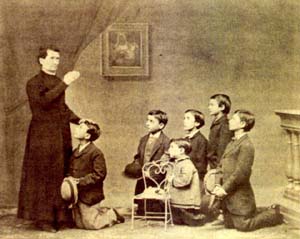 Is it better to be Prudent or not? When discussing the infamous educational system of St. John Bosco (Preventive System) one cannot help to see how prudent he was in helping the children of Turin.
Is it better to be Prudent or not? When discussing the infamous educational system of St. John Bosco (Preventive System) one cannot help to see how prudent he was in helping the children of Turin.
The Method of St. John Bosco
A striking characteristic one encounters upon reading about St. John Bosco and his Preventive System is just how direct his methods were in acquiring the attention of a child. His Preventive System of Reason, Religion and Kindness can be said to be hinged on the virtue of Prudence. How so? When you take the first principle of Reason, the child would be given an opportunity to consent to guidance and instruction. Take note that the first principle does not dictate or mandate anything. On the contrary it offers an opportunity for a child to consider the guidance and instruction St. John Bosco would keenly offer.
Human virtues, as the Catechism reminds, us are: firm attitudes, stable dispositions, habitual perfections of intellect and will that govern our actions, order our passions and guide our conduct according to reason and faith (CCC 1804). This catechetical instruction aptly describes St. John Bosco’s intentional practice to encourage and then draw in a child to live a life in conjunction with faith and reason.
What St. John Bosco wanted to establish with the child was a bridge from where he was to where he could be if open to it. The hope of this bridge was to bring the child toward Christ thus establishing a joyful spirit.
The second principle of Religion stressed the ugliness of sin and the value of living a virtuous life. The purpose of this second principal was to direct the child’s actions toward a greater good. We can say that aim was to help the child practice good things versus bad ones. In other words, holiness is the aim in this second principle. Five simple methods of this principle are as follows:
- Holiness of ordinary life
- The joy and optimism of holiness
- Centrality of Confession
- The Holy Eucharist
- Love of Mary
The third principle of Kindness emphasizes the theological virtue of love. St. John Bosco would stress: “Let us make ourselves loved, and we shall possess their hearts.” In other words, our Christian witness must be constant for the development of the child. The learning environment should be warm and inviting, not cold. The family spirit reigned; he did this through rapport, friendliness, presence, respect, attention, dedication to service, and personal responsibility.
The Exercise of Virtue and the Value of Prudence
The exercise of virtue lies at the heart of St. John Bosco’s Preventive System. Each child was offered the opportunity to pursue the good and live it through an active sacramental life in Christ. If there was one particular virtue that stood out in the Preventive System, it was the virtue of Prudence. Why, because exercise of this virtue disposes the person to practical reason to discern out true good in every circumstance and to choose the right means of achieving it (CCC 1806). Our actions should be directed by a right sense of reason and not a wrong one. In other words it means to set a standard of right behavior ordered towards the good who is Christ Himself.
St. John Bosco desired that the children in his oratory both boys and girls make correct and moral choices. This involves making right judgments which in turn would lead toward a Christian moral principle to live by. It guides our discernment in embracing and understanding good and avoiding evil.
St. John Bosco, father an teacher of youth, raised up by God, especially for the salvation of poor and needy children: obtain that we may be enkindled by the same fire of charity as inflamed thee. Thou dist labor unceasingly in search of souls for Christ. May we, with the help of thy prayers, find God as thou didst, and enjoy eternal beatitude with thee. Amen!



